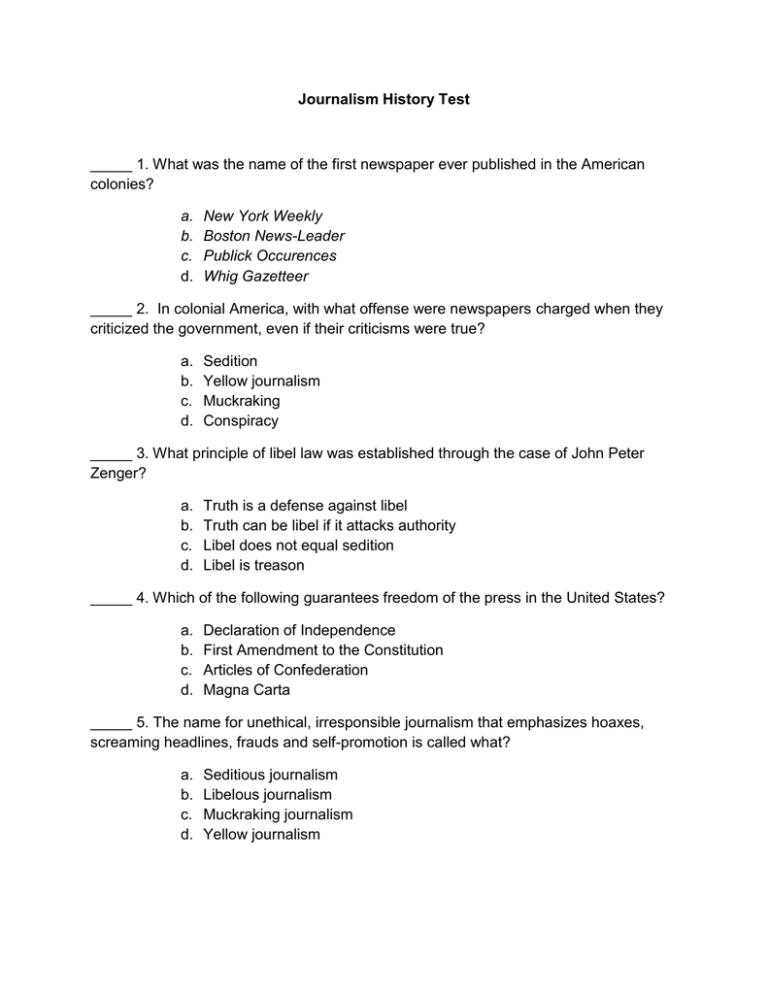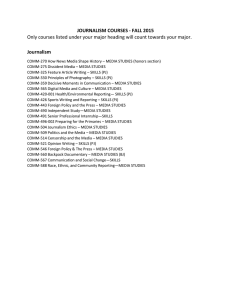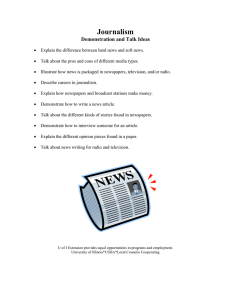Journalism History Test colonies?
advertisement

Journalism History Test _____ 1. What was the name of the first newspaper ever published in the American colonies? a. b. c. d. New York Weekly Boston News-Leader Publick Occurences Whig Gazetteer _____ 2. In colonial America, with what offense were newspapers charged when they criticized the government, even if their criticisms were true? a. b. c. d. Sedition Yellow journalism Muckraking Conspiracy _____ 3. What principle of libel law was established through the case of John Peter Zenger? a. b. c. d. Truth is a defense against libel Truth can be libel if it attacks authority Libel does not equal sedition Libel is treason _____ 4. Which of the following guarantees freedom of the press in the United States? a. b. c. d. Declaration of Independence First Amendment to the Constitution Articles of Confederation Magna Carta _____ 5. The name for unethical, irresponsible journalism that emphasizes hoaxes, screaming headlines, frauds and self-promotion is called what? a. b. c. d. Seditious journalism Libelous journalism Muckraking journalism Yellow journalism _____ 6. This type of journalism fought to bring to light social injustices and right wrongs in places like hospitals. a. Seditious journalism b. Libelous journalism c. Muckraking journalism d. Yellow journalism _____ 7. During which era was the telegraph the most useful to reporters? a. b. c. d. Revolutionary Civil Rights Civil War Vietnam War _____ 8. Before the Penny Press newspapers were filled with? a. b. c. d. Ads, letters to the editor, random things Only war news News about natural disasters and crime Sports scores _____ 9. Who was notorious for yellow journalism? a. b. c. d. Patty Hearst William Randolph Hearst John Peter Zenger Ida Tarbell _____ 10. Nellie Bly was famous for writing about: a. b. c. d. Women’s issues Social investigative reporting Sports Education _____ 11. Which of the following stories might you read today that would be similar to something Bly would have written? a. b. c. d. NFL sues Tom Brady Conditions in veterans’ hospitals A new super commuter train Life of a new president _____ 12. “The Federalist Papers” were signed by: a. b. c. d. Alexander Hamilton George Washington Joseph Pulitzer Publius _____ 13. “The Federalist Papers” were written to: a. b. c. d. Convince the British to go home Convince the voters of Massachusetts to ratify the constitution Convince the voters of New York to ratify the constitution Convince the colonists that the colonies should go to war with Britain _____ 14. How did the Penny Press change the financial stability of newspapers? a. b. c. d. Newspapers went bankrupt Uses advertising to pay the bills All finances based on money from sales Papers wouldn’t cost more than 25 cents. _____ 15. The telegraph led to what style of journalist writing? a. b. c. d. Inverted square Inverted pyramid Essay-driven style Wire service _____ 16. Why would a newspaper want to subscribe to a wire service in the later 1800’s? a. b. c. d. Save on payroll So they could fire bad reporters Cover Civil War battles and receive news instantly It was the trend at the time _____ 17. Stirring up trouble and printing false reports after the sinking of “The Maine” is an example of what type of journalism? a. b. c. d. Investigative In-depth Yellow journalism Muckracking _____ 18. Which war put CNN in the national spotlight? a. b. c. d. Civil War WWII Afghanistan Gulf War I _____ 19. What type of action in the 1950s allowed that signaled the decline of newspapers? a. b. c. d. Censorship Popularity of radio television computers ____ 20. In what year did CNN first start broadcasting? a. b. c. d. 1979 1980 1987 1991 _____ 21. MTV was the first television station to play all: a. b. c. d. News Music Sports Reality TV _____ 22. What was the release of classified documents to the New York Times regarding the Vietnam war called? a. b. c. d. Pentagon Papers Ellsburg Leak New York Times’ Vietnam Leak White House Papers ____ 23. In addition to bringing social injustice to life, Nellie Bly was also considered: a. b. c. d. Empathetic for her stunts Charitable Role Model for women All of the above ____ 24. Edward R. Murrow became famous because he: a. b. c. d. Helped start CNN Informed people of events of WWII in newspapers Broadcasted the lasted news from London every night on the radio Invented the radio ____ 25. Carl Bernstein and Bob Woodward ushered in a new type of investigative journalism that focused on: a. b. c. d. Exposing government corruption Going undercover for months Concealing sources More concise or clearer writing Short answer (2 points each) 26. Why is the Zenger verdict so important today? 27. Explain the Civil War’s impact on Journalism. 28. How did newspapers aid the Revolutionary War? 29. Why would something like “The Federalist Papers” not be printed in a newspaper today? 30. Why was yellow journalism such a bad thing for newspapers? 31. What does the inverted pyramid do, and when did reporters start using it? 32. Please describe one example of how muckraking was used? 33. Why did newspapers begin to lose popularity during WWII? 34. Why is the creation of CNN so important in the media world? 35. Please describe the events that caused everyone to start using CNN as their main source of minute by minute news. 36-40. Please write the First Amendment on the back of the multiple choice answer sheet. Name: __________________________________ Please write the multiple choice answers on this sheet. 1. _____ 20. _____ 2. _____ 21. _____ 3. _____ 22. _____ 4. _____ 23. _____ 5. _____ 24. _____ 6. _____ 25. _____ 7. _____ 8. _____ 9. _____ 10. _____ 11. _____ 12. _____ 13. _____ 14. _____ 15. _____ 16. _____ 17. _____ 18. _____ 19. _____ 20. _____ 21. _____ 22. _____


